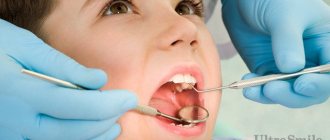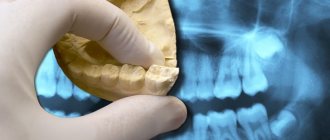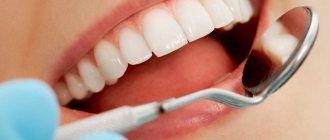For a child, going to the dentist can be a real ordeal. It’s good that in the hands of an experienced specialist, the baby is able to relax and forget about pain. Adult and pediatric dentistry differ in many ways. For example, a doctor “for the little ones” is familiar with the peculiarities of teething, the differences between milk and permanent teeth, and other anatomical aspects of a young patient.
Photo: pixabay.com
In the ranking of the twelve best children's dentistry in Moscow, there was a place for both family and highly specialized clinics. This means that in some cases it is available to children and their parents, while in others it is only available to minors. This is worth paying attention to when planning your visit.
All institutions presented on the list can boast:
- Friendly atmosphere.
- Cozy interior.
- A team of professional doctors.
- Thorough disinfection of instruments.
- Wide range of services offered.
The main goal of this format is to level out stressful emotions, avoid pain during the manipulation process, and encourage the child to continue visiting doctors. According to the above characteristics, the Medsi private clinic deserved the palm. Having gained sufficient experience working with a wide variety of children, they are able to find an approach to even the most capricious and difficult patient.
We present the rating of children's dentistry in Moscow 2022. The best 12 institutions that were selected by our experts based on user reviews and ratings.
Rating:
- Medsi (in Blagoveshchensky lane)
- Dental Fantasy
- Baby Dent
- Jagged
- RuDenta Kids
- Baby and Carlson
- Mi Pol
- Martinka
- Preamble
- Nibbler
- Nutcracker
- CrocoDent
Why is it important to treat baby teeth?
The permanent tooth germ is located next to the root system of the deciduous segment. Inflammatory pathologies and injuries of the milk segments harm the unformed structures of future teeth (they may die or develop with a defect). In addition, baby teeth must be maintained in good condition for the following reasons:
- if caries begins to progress, pain appears;
- treatment of superficial segment damage is easier to tolerate than complicated pathology;
- inflammatory diseases of dental tissues are a source of infection in the mouth;
- foci of pathological flora reduce immunity, which can cause chronic inflammatory diseases (tonsillitis, pharyngitis, rhinitis, etc.);
- decayed teeth change the bite. In order to have a beautiful smile and straight teeth in the future, orthopedic correction will be required;
- carious cavities are a source of putrid odor from the mouth.
Features of the work of a mid-level specialist
Based on the diploma received, the dentist, as mentioned earlier, can perform various dental procedures, but at the same time limits complex types of treatment, for example, treatment of pulpitis, prosthetics.
Patients should know that despite the promises made by the doctor, it is impossible to carry out complex medical procedures without the appropriate education and experience .
Only a good dentist with experience and professional knowledge can achieve a high-quality treatment result.
To improve his qualifications, after a certain time, the dentist must necessarily upgrade his category.
- A doctor with a second category - his work experience must be more than 3 years after receiving an education document. He must know the theory well and have at least some work experience.
- A doctor of the first category - he must have at least 7 years of work experience. He is obliged to periodically improve his knowledge in his field.
- A doctor with the highest category must have at least 10 years of experience in his specialty. This category corresponds to high theoretical and practical training.
How to prepare a child
An important point in a child’s first visit to a pediatric dentist is his psychological attitude. It has been proven that children who have not had negative experiences with dental treatment do not experience fear of the dentist. Mostly, fear of the dental office is transmitted from adults.
One of the most common mistakes parents make is an attempt to deliberately reassure the child, using the phrases “don’t be afraid”, “it won’t hurt you”, “it’s not scary at all”, etc. The child’s subconscious will pick up from these phrases only the negative particle “not” , which will result in the opposite effect. The child may also begin to experience anxiety, since the parents’ experiences will be transmitted on an emotional level.
Before visiting a pediatric dentist, it is better to contact the selected clinic for an adaptation appointment or try to explain the peculiarities of the doctor’s work on your own. For older children, you can explain in detail what awaits them in the dentist's office and why it is important to treat their teeth. For the same purpose, you can show kids an introductory cartoon or play doctor. If your child is about to undergo dental treatment, you should not deceive him by saying that the doctor will only look at his teeth. You should immediately warn that certain manipulations will be performed that are necessary for dental health.
Important! The time to visit the pediatric dentist should correspond to the child’s routine. It is advisable to make an appointment for younger children in the morning, since they have a schedule in the form of daytime sleep and meals at a time, and after lunch the kids get emotionally tired. This may complicate treatment.
When is consultation required?
It is necessary to contact a pediatric dentist if your baby develops pathological symptoms:
- toothache;
- gums bleed when brushing teeth or eating;
- the enamel has changed color;
- dental deposits have appeared that cannot be removed on your own;
- discomfort when eating sweets, cold, hot foods;
- redness, swelling, ulceration of the mucous membranes of the mouth;
- Dark spots and cracks are observed on the tooth surface;
- unhealthy breath;
- delayed teething, etc.
To prevent the appearance of pathologies and identify them at an early stage of development, visit a pediatric dentist every 3 to 4 months (caries in baby teeth progresses faster than in permanent teeth).
Modern pediatric dentistry has a wide range of capabilities and methods that make it possible to treat a child’s teeth without pain, in comfortable conditions. A good pediatric dentist will establish a psychological connection with the baby and try to carry out treatment competently and as quickly as possible. To prevent your child from being afraid of going to the dentist, give him the right motivation and never scare him with the dentist.
What do doctors do?
A dentist is a specialist with secondary education . After a new specialist graduates from medical school, he has the right to specialize in the treatment of hard dental tissues, dentin and enamel.
Therefore, he will not be able to help a patient who came to him with acute pain, but he has the right to perform several manipulations:
- examines the oral cavity and finds out the cause of pain;
- provides therapy for gum disease;
- fills a tooth with minor damage;
- Refers for consultation to a specialist doctor for deep caries.
If a dental specialist encounters a problem in the oral cavity that he does not have the right to solve, he must refer the person to another doctor with a higher education.
A dentist is a specialist who studied at a higher educational institution for six years and spent another year in internship. He has a wide medical specialization and can perform a variety of manipulations in the mouth:
- treat and remove teeth;
- insert dental implants;
- straighten the bite.
Few people understand what exactly distinguishes a dentist from a dentist. But knowing the different areas of dentistry will allow you to quickly find the dentist you need.
What is the difference between specialties?
Both of these professions differ in the level of training and the type of medical manipulations that they can perform. Based on the job description, the dentist does not perform certain types of therapy.
- Many specialists with secondary education say that they perform therapy no worse than those with higher education and support such arguments with reviews from people they treated.
- Without the proper level of knowledge, it is impossible to correctly deal with complex cases and avoid side effects.
- If a specialist does not improve his qualifications, he will not have the right to offer a gentle method of therapy to a person.
The presence of a specialist’s category affects not only his professionalism, but also his salary.
You don’t need to think that when you come to see a dentist, he will be able to solve all your problems. The list of diseases is wide, so one specialist cannot treat them. Dentists come in the following areas :
- Therapist. Such a doctor has the same responsibilities as a dental specialist. In addition, he has the right to solve more complex problems with gums and teeth and has a wide range of responsibilities:
- provides therapy for pulpitis and caries;
- installs fillings in case of tooth decay;
- provides treatment for severe gum inflammation;
- performs teeth whitening procedure;
- carries out prevention.
- Orthopedist . A doctor in this specialty restores teeth that are dilapidated or have lost their aesthetics using prosthetics. He makes impressions of the teeth, which the dental technician then uses to make dentures. In addition, he tries on and secures the prosthesis in the oral cavity.
- Orthodontist. A large number of patients turn to such a doctor. Its main task is to restore the dentition and give the patient a beautiful smile.
The presence of bite defects can not only spoil the appearance, but also cause severe pathological changes in the functioning of other organs.
The main responsibilities of a doctor in this specialization:
- restore an even row of teeth on the gum surface;
eliminate wide gaps between teeth;
- correct the normal growth of permanent dental units;
- provide practical recommendations for the prevention of malocclusions.
- Surgeon. The specialist has the right to carry out the following types of manipulations:
- performs removal of diseased teeth if they cannot be restored;
- deals with the extraction of healthy teeth that interfere with the normal growth of neighboring ones;
- corrects dental deformations, removes wisdom teeth;
- carries out various types of prosthetics.
- Periodontist. The responsibilities of this specialist include:
- drawing up the correct treatment plan, which consists of taking impressions of the patient’s jaw, sending him for an x-ray and sending the collected materials to the laboratory;
- installation of finished structures after all stages of the examination and issuance of recommendations for their care;
- monitoring the patient at all stages of therapy, installing braces and other devices.
Periodontists deal only with periodontal therapy, the soft tissues surrounding the teeth.
The main problems of childhood dental diseases and their solutions
The initial category of problem areas in children is the treatment of baby teeth. This group includes children of the youngest ages who require special attention and approach. Almost all clinics specialize in this topic.
Why should a damaged tooth be restored? The goal of this procedure is to preserve the integrity and functionality of the tooth until a permanent one arises. The goal is the full development of the child’s speech apparatus, preventing the risk of malocclusion and ensuring psychological comfort. This procedure is also used in older age. There may be large and small differences in price (depending on the degree of the problem with the tooth).
A tooth can be restored to its original appearance through a painless procedure, which is done using the latest developments (Sleep anesthesia). For this purpose, inhalation of the drug “Sevoran” is used (harmless, does not contain narcotic substances). The effect of anesthesia is 1 hour.
Anesthesia "Sleep"
American dentists recommend performing the first dental treatment for a child in this way. Because it prevents children from forming negative impressions about dental treatment.
Anesthesia does not have a bad effect on the child’s body: children tolerate the procedure much better due to their age, since they have not had time to acquire general somatic diseases that bother adults.
Advantage: all baby teeth can be effectively treated in one session.
The average hourly price for such anesthesia is 2,400 rubles.
Periodontics is an important branch of preventive treatment of tissues near teeth and their defects. It is considered one of the most expensive branches of dentistry. Specialists competently select pain-relieving techniques when treating a child’s teeth, based on the situation and psychological characteristics of the patient.
Installing a crown on baby teeth is used to strengthen the enamel of primary teeth.
Crowns on teeth
To restore the chewing surface, inlays are made that fill the void of the tooth.
Tooth tab
The simplest and most inexpensive way to fill this is to install a seal.
Bite correction can be done in any of the clinics listed above; most often, it is leveled with special plates.
Plates for correcting bite









